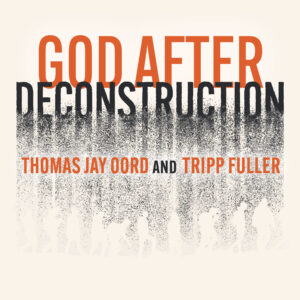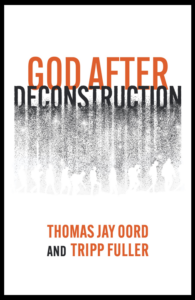The Bible After Deconstruction
In God After Deconstruction, Tripp Fuller and I explore the problems scripture presents. We show that the Bible has errors, discrepancies, mistakes, and internal inconsistencies. It is not the sure and certain foundation so many people expect, and deconstructors are right to rethink scripture.
But if the Bible can’t always be trusted, then what should we do with it? If it is plagued with errors and contradictory portraits of God, why keep it around? What good is scripture?
Few who find problems in the Bible want to return to the intellectual and spiritual bondage associated with “inerrant,” “infallible,” or the label, “Bible believer.” Deconstruction can lead to searching for better ways to approach scripture. Several options are available.
Take a Break
For some, the best option will be simply to walk away from the Bible…at least for a while. The traumas and triggers associated with scripture leave some little recourse but to set it aside.[1] And that’s perfectly fine as a strategy. The overwhelming majority of saints in the first 1,800 years of Christianity did not read the Bible directly or hear it in a language they understood. Some say the “book of nature” inspires them more than any human book, and time in the outdoors becomes spiritual food. Try taking a Bible hiatus, if you need to.
Argue with the Text
We can also push back against the Bible and what we think it says. Judaism has a strong history of encouraging arguments with and about sacred texts. This extends beyond disagreement about translations and interpretations. It follows the examples of those who argued directly with God, such as Abraham, Elijah, David, Jacob, Jeremiah, Job, and Moses.[2] When encountering a passage that contradicts another or opposes what we believe is true, it’s fine to say, “This part of the Bible must be wrong!” Resist and criticize scripture, and don’t be afraid to argue with it.
Find the Big Themes
Some who deconstruct decide a major theme in scripture is still worth embracing, even if other parts are not. Problematic passages then get judged in light of this major theme. For many, the overarching motif of the Bible is love. Any text that portrays God as unloving or as wanting humans to act in unloving ways is, therefore, erroneous, or needs more scrutiny to understand what’s going on. Let love be the interpretive lens—this can take us a long way.
Pick out the Good, Set Aside the Bad
Many who deconstruct embrace the biblical passages they find believable and reject those they don’t.[3] Thomas Jefferson deleted passages he thought untrue, but he was doing explicitly what the rest of us do implicitly. Even Jesus quoted some Old Testament texts and ignored others.[4] Despite what some conservatives or fundamentalists say, embrace “picking and choosing” some passages and rejecting others. They do it themselves!
Accept Human Perspectives
Some have been taught that biblical inspiration means God guarantees the Bible to be true in all it says. But many who deconstruct realize scripture writers operate from their own views on God and reality. Because humans cannot capture truth fully, the Bible offers diverse and sometimes even untrue ideas about God and existence.[5] Whatever “inspired” means, it doesn’t negate the fact that people wrote the Bible.[6] The writer of Ecclesiastes who says “all is vanity” isn’t speaking everywhere for all time, for instance. Accept that people have perspectives and sometimes make mistakes.
Read the Bible in Community
When few could read, and only clergy had the biblical text, direct access to scripture was limited. With the printing press, social media, and widespread literacy, just about any contemporary person can read the Bible for themselves. Consequently, “private” interpretations have become the norm. But what “I” think the Bible means may be highly influenced by destructive interpretations from the past. Some who deconstruct find help reading the Bible alongside others who propose positive interpretations of passages that once caused harm. Fellow travelers in deconstruction may reframe scripture in liberative and nourishing ways.
Read the Bible as Literature
The Bible is literature, so why not read it as such? Why not use literary criticism and other methods of textual analysis? Approaching scripture as literature doesn’t require us to deny that it offers some truths or that God influenced its authors. But reading the text in a literary way makes it easier to handle understanding inconsistencies, discrepancies of fact, historical realities, various genres, and diverse voices. Explore scripture as literature.[7]
Jesus is the Point
Some who deconstruct still interpret the Bible as aimed toward the life and message of Jesus. Those who believe this Nazarene offers the clearest revelation of God have the option of reinterpreting or ignoring passages that contradict his example.[8] If Jesus is special, why not take his life, teachings, death, and resurrection as the primary lens to make sense of scripture? Looking at the text through a “Jesus lens” doesn’t solve every problem, of course, but it solves some.[9] Be Christocentric. Things may pop differently.
Progressive Revelation
Some Christians and Jews believe biblical writers slowly gained clarity about who God is and what God wants. We can see revelation as progressive, not instantaneous. Some beliefs once thought essential—e.g., burnt offerings and circumcision—turn out to be nonessential in later biblical texts. We attain greater clarity about other matters of life—why not greater clarity about God?[10] We’re still evolving culturally. Our understanding can evolve too.
Each of these approaches to the Bible offers something valuable. Embracing God after deconstruction doesn’t mean returning to the old and unhelpful. There are better ways of understanding what’s going on in the Bible.
Living a Deconstructed View of Scripture
The testimonials of those who deconstruct reveal that scripture remains valuable for some, but not others. As with many aspects of deconstruction, experiences vary.
Giving himself permission to set the Bible aside was, for Kevin, what helped most. “I’m getting more encouragement and hope from other studies than I was getting from the Bible,” he says. “If God is truly everywhere, the world can be my scripture.”
Ahned says he no longer reads the Bible, and he no longer attends church. Biblical passages trigger her. “When I hear scripture, my mind goes to Christians who betrayed me,” she says. “At least for now, I’m detoxing from the Bible.” Some people need this.
Cheryl’s process of deconstruction led her to explore the work of biblical scholars, historians, and archeologists. “The Bible is not a single book,” she concluded. “It’s a collection of texts written by different people, in different contexts, for different audiences.” Brian thinks similarly, and he says the Bible is plurivocal.[11] By this, he means it has many voices, not just one.
Jeremy changed his view of biblical inspiration. “God didn’t control the writing of the biblical texts to make them error-free,” he says. “The Bible is better understood as a testament to vast and diverse human experiences of what writers considered God’s activity.” Many progressive Christians hold this view. Some even say, “We take the Bible too seriously to take it literally.”[12]
“Discovering an entire world of biblical scholarship allowed me to embrace doubts, uncertainties, and different ways of understanding the texts,” says Jamie. “For instance, finding that early church fathers thought the author of the fourth gospel was not writing a historical record was mind-blowing.”
Carol’s experience is similar. “Once I accepted the Bible as a library of books, written by flawed authors,” she said, “the bowling pins tipped over one after another. Once the Bible was a human book, my true spiritual exploration could go forward without insurmountable obstacles.”
Stephanye admits that her need for absolute confidence was a problem. “My 21st-century framework for certainty and my view of truth were obstacles,” she says. “But I came to think none of us ever figure out these issues entirely. And that’s okay.” She has learned to live with uncertainty.
For More
The paragraphs above are part of a larger chapter on scripture and deconstruction in God After Deconstruction. This chapter is among eleven others exploring the book’s theme. Find copies at your favorite booksellers, including Amazon.
[1]. For a testimonial on this, see Brianna Bell, “I Stopped Reading the Bible,” Nov. 1, 2019. https://broadview.org/i-stopped-reading-the-bible/
[2]. Matthew Korpman addresses this well in Saying No to God (Oak Glen, CA: Quoir, 2019).
[3]. See Russell Preagant, Reading the Bible for All the Wrong Reasons (Minneapolis: Fortress, 2011).
[4]. Derek Flood explains this well in Disarming Scripture (Metanoia, 2014).
[5]. A number of books address how our cultures, biology, histories, and more affect biblical interpretation. As an example, see Miguel De La Torre, Reading the Bible from the Margins (New Jersey: Orbis, 2002), 2. See also Esau McCaulley, Reading While Black (Downers Grove, IL: IVP Academic, 2020).
[6]. On biblical inspiration, see Gabriel Gordon, God Speaks (Oak Glen, CA: Quoir, 2021); Zack Hunt, Godbreathed: (Herald, 2022).
[7]. On reading the Bible as literature, see Brian D. McLaren, Faith After Doubt.
[8]. For instance, see Keith Giles, Jesus Unbound: Liberating the Word of God from the Bible (Oak Glen, CA: Quoir, 2018); Bradley Jersak, A More Christlike Word (Plain Truth Ministries, 2021).
[9]. See Deanna Young, Unblaming God: Interpreting the Old Testament through the Lens of Jesus Christ (Grasmere, ID: SacraSage, 2023).
[10]. For one of the more helpful guides to reading the Bible, see Scot McKnight, The Blue Parakeet (Grand Rapids, MI: Zondervan, 2018).
[11]. Brian Felushko and others call the plurivocal nature of the Bible “polyphonic.” See his blog for essays on the subject (https://allthingsbiblicalca.wordpress.com/). This is a recurrent theme in Dan McLellan’s podcast “Data Over Dogma.” https://www.maklelan.org/
[12]. See Bishop Kenneth L. Carder, “I Take the Bible Too Seriously to Take It Literally,” https://shiftingmargins.com/2019/09/13/i-take-bible-too-seriously-to-take-it-literally/



Comments
I appreciate the various perspectives offered here on how to read and interpret Scripture. The ideas that inerrancy, inspiration, and univocality completely fall apart when the biblical texts are examined without the fundamentalist/conservative presuppositions. Given that the biblical texts are not inerrant, inspired (in the traditional sense), nor univocal, then appealing to biblical passages for authority to promote any given theology, over others, is (IMO) a misuse of Scripture that is of human origin. We can’t say that univocality, inerrancy, and inspiration of the biblical texts is off the table, and then turn around and appeal to biblical texts as proof that our choices of texts are the ones that present the true picture of God’s nature, working, and/or will. I am on the same page as Christian Smith who does a very thorough job of explaining the idea of “pervasive interpretive pluralism” as proof of the mulitivocality, errancy, and human authorship of the biblical texts. As Daniel McClellan points out repeatedly, “the Bible” has no inherent authority; its only authority is the authority we choose to give to it, or—more often—to parts of it. We give authority to the biblical texts, most often, when and where we interpret certain texts to be in agreement with the portrait of God’s nature, working, and will that we want to believe. For example, where the biblical texts state or imply directly that “God is love” is not an appeal to authoritative truth, but demonstrates a choice that this is who we want God to be and how we want God to act. In fact, it may be true that is exactly who God is, but 1 John 3–4 does not prove that is God’s true and abiding nature. Again, I appreciate the variety of perspectives on Scripture that are provided in this essay. Pervasive interpretive pluralism is a fact and has been even before particular texts were included in the biblical canon.